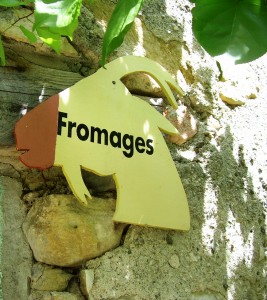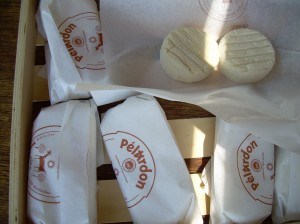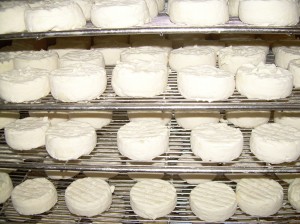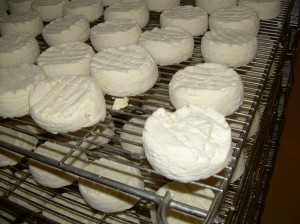My stay at SupAgro University has certainly given me an in depth look into the French food labeling system, and today was excellent for going beyond the policy literature to see a real world example. We ventured out into the country in the Languedoc region to visit the goat farm of Jean Poudevigne and learn about, (and taste!) the renowned Pélardon cheese.
This cheese, pictured below, is marked with the AOP label which stands for Appellation d’Origine Protégée. This means that the product is under very specific restrictions and the consumers know they are getting the real deal. The AOP is a label recognized on the European Union scale and is in the process of replacing the French AOC (Appellation d’Origine Contrôlée) label. Both labels ensure the geographic origins, the process, and the quality of a product. For example, the label guarantees that Pélardon cheese is “copyrighted”, it cannot be labeled as Pélardon anywhere else in the world except in Cevennes and Languedoc. In addition to the location requirement, the cheese needs to be made with goat cheese, from an unfrozen curd, and aged at least 11 days to be considered Pélardon. We actually tasted the cheese throughout all steps of the aging process-a one day old cheese, a 12 day old cheese, now true Pélardon, and a 3 month old cheese, also Pélardon. In the picture, the younger, very creamy, cheese is on the right. The 3 month old cheese, on the left, was quite strong for my tastes, but pairs well with the strong red wine of the Languedoc region. Jean Poudevigne pointed out that the stronger flavored cheese profiles of Pélardon are usually preferred by the older generations of southern France and by young girls-definitely interesting!
It was also very interesting to discuss the producer’s take on the label regulations. Mr. Poudevigne agreed that the AOP label is totally worth the regulation hassle because it opens up the market for him, and allows producers to set similar prices for a specific quality. Marsden and Smith’s 2005 paper, “Ecological entrepreneurship: sustainable development in local communities through quality food production and local branding,” discusses existing sustainable operations are occasionally overlooked and not supported due to initiatives that support large scale sustainability policies. They also discussed the concept of sustainable value creation, where additional value is added to mainstream farm products through Agro-tourism, and the concept of ecological entrepreneurship where a farmer preserves cultural, ecology and environmental integrity, but find ways to obtain economic benefits. It seems to me that the French concept of the AOC label allows both sustainable value creation and ecological entrepreneurship to take place, is valuable for even a small scale producer, and is a very informative label for the consumer.
Mr. Poudevigne discussed with us briefly how it is hard to supply the specialty cheese shops, local grocery stores, on site sales, market sales, and the supermarket with a high quality product on a year round basis. In order to do this, the farm has two sets of goats on different milking schedules throughout the year to ensure enough production.
This was my first experience eating unpasteurized cheese, notice that I lived to tell about it, but unfortunately due to regulations, I will not be able to bring back any of my 11 day aged unpasteurized Pélardon. According to Mr. Poudevigne, unpasteurized cheese is better as it still has the good bacteria that helps keep the bad bacteria at bay-I’ll let the professionals debate that one… and in the meantime, will just enjoy the Pélardon and the desserts!





Speak Your Mind